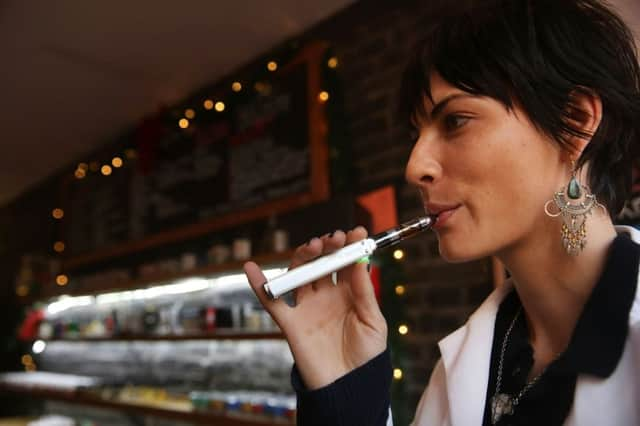Leaders: Experts right not to stub out e-cigarettes


The appeal does not, of course, diminish the reality that smoking is a threat to health, both directly to the smoker and to those in close proximity who then become “passive smokers”. Nor should it diminish the important educational and advisory work that anti-smoking groups and health organisations undertake every day to bear down on smoking and to encourage smokers to quit.
It is in this context that sales of e-cigarette devices have soared in recent years. They deliver a two-fold benefit. The first is to sharply reduce the incidence of carcinogenic smoke. And the second, no less important, is to help regular smokers to quit. The devices are frequently used both to reduce nicotine dependence and to help break smokers’ addictive behaviour.
Advertisement
Hide AdAdvertisement
Hide AdHowever, some anti-smoking campaigners have questioned these benefits, arguing that resort to e-cigarettes can prolong addiction when the exercise of willpower is the most immediate and effective solution. A further objection is that e-cigarettes help to “normalise” smoking as a habit and thus encourage young people to take up smoking.
The smoking ban in public places has greatly helped to tackle the harmful effects of passive smoking. While requiring smokers to exit public buildings, it was not designed – as some might wish – to drive smokers out of public view altogether.
Now a group of 53 experts from 15 countries have written to the WHO to urge it not to “control and suppress” the devices, saying they have the potential to save millions of lives. The appeal comes as the WHO prepares to publish recommendations about e-cigarettes to governments later this year.
They argue that “the potential for tobacco harm reduction products to reduce the burden of smoking-related disease is very large, and these products could be among the most significant health innovations of the 21st century – perhaps saving hundreds of millions of lives. The urge to control and suppress them as tobacco products should be resisted and instead regulation that is fit for purpose and designed to realise the potential should be championed by WHO.”
The central argument is that rumoured action by the WHO to turn against e-cigarettes, treating them as no less risky than conventional cigarettes, would discourage smokers from trying them as an aide to quitting. This is sensible advice which the WHO should heed. There are positive benefits from these devices which should not be ignored, and this does not cut across the critical message that the conventional methods of smoking tobacco are deeply harmful and should be strongly discouraged.
High hopes for snow business
Those looking for heavy snow this year would have been well advised to give Aspen and royal favourite Klosters a miss – and opt instead for Glencoe, Cairngorm and Glenshee. In fact, while world-renowned ski resorts had lighter snow, Scotland’s ski centres had too much. By the end of January there was deeper snow on most of Scotland’s upper pistes than there was in the Alps, the Pyrenees and even the Rockies. Some pistes in the Highlands were twice as deep as those overseas – and still the snow kept coming.
A good year might have been even better but for access problems caused by the abnormally heavy snowfalls and resort staff being required to dig out chairlifts and tow huts.
These problems notwithstanding, the resorts enjoyed a good season, with a total of more than 23,000 skier days across the five ski centres.
Advertisement
Hide AdAdvertisement
Hide AdThese are often seen as marginal to Scotland’s tourist economy. In fact, snow sports make a very significant contribution. For each £1 spent at a ski area, a further £4 is spent “off the hill” in local businesses such as accommodation, places to eat and drink, shops, filling stations and the like. The excellent 2012-13 season has been reckoned to be worth £5.8 million directly to the ski areas themselves and more than £29 million to the wider Scottish economy in shop purchases, hotel bookings, petrol and travel expenditure.
This underlines the importance of keeping our road infrastructure open and up to the mark to enhance access and to help maximise the number of overseas visitors during the winter season. Let’s hope the irony of too much snow for a really successful season becomes a thing of the past.